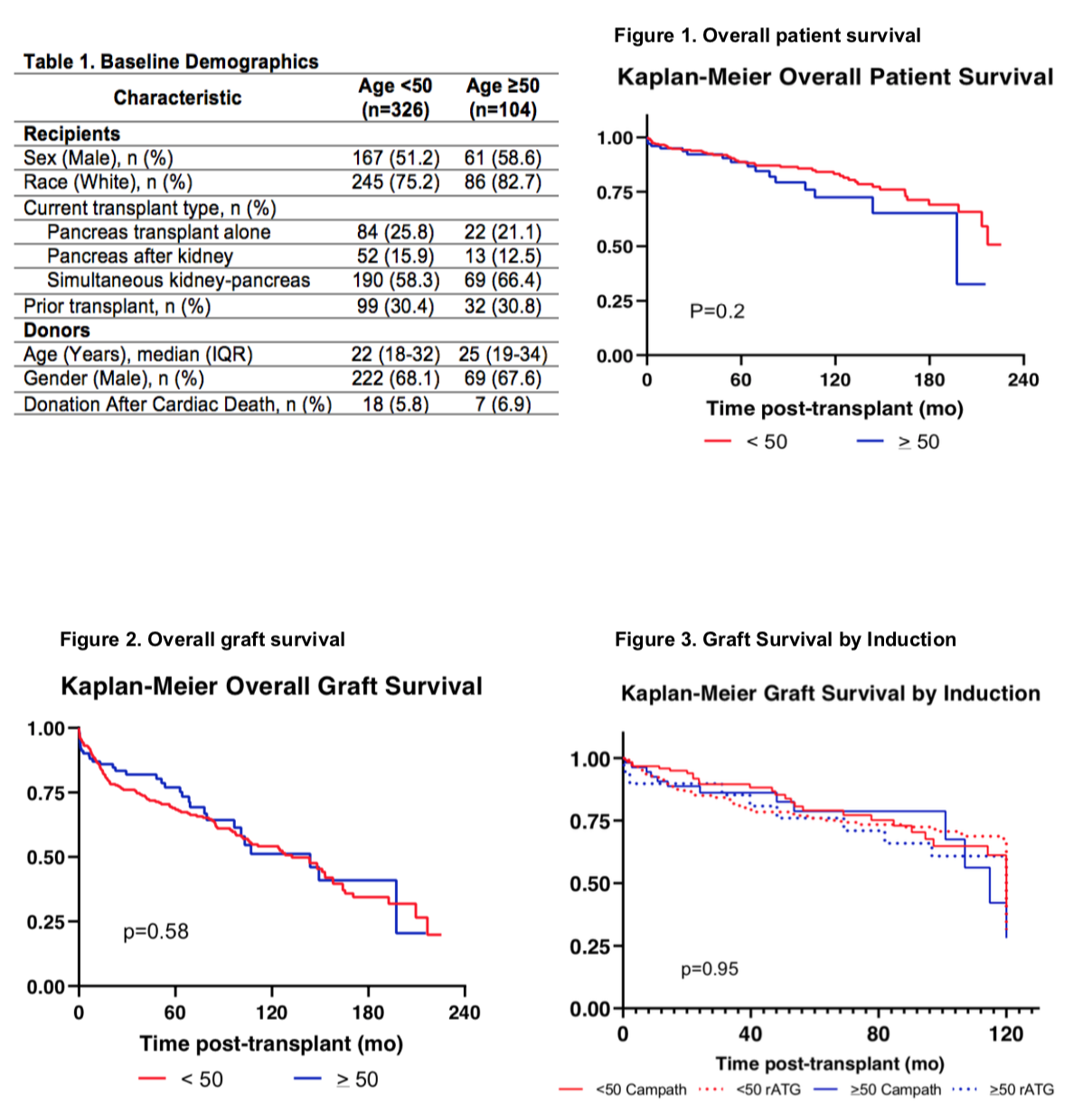Pancreas Transplant in Patients Older Than 50: An Analysis of Outcomes and Immunosuppression
1Pharmacy, University of Maryland Medical Center, Baltimore, MD, 2Medicine, University of Maryland Medical Center, Baltimore, MD
Meeting: 2020 American Transplant Congress
Abstract number: D-247
Keywords: Age factors, Graft survival, Induction therapy, Rejection
Session Information
Session Name: Poster Session D: Pancreas and Islet: All Topics
Session Type: Poster Session
Date: Saturday, May 30, 2020
Session Time: 3:15pm-4:00pm
 Presentation Time: 3:30pm-4:00pm
Presentation Time: 3:30pm-4:00pm
Location: Virtual
*Purpose: Pancreas transplant (PT) is the ideal therapy for many patients with diabetes and kidney failure. There are limited published data addressing the impact of recipient age on post-transplant outcomes. Kidney transplant literature suggests that immune senescence increases with age, and that immunosuppression should be tailored accordingly. As our recipient profile has aged, we sought to determine if outcomes differed based on age in the context of immunosuppression choice.
*Methods: This single-center, retrospective cohort study included adult solitary and combined PT recipients between 1/2000 and 5/2018 stratified by age (18-49 and ≥50). The primary endpoint was graft survival at 1 year. Secondary endpoints included patient survival at 1 year, overall patient and graft survival, and incidence of biopsy-proven acute rejection (BPAR).
*Results: This study included 430 patients with 104 that were ≥50 years. Baseline demographics did not differ between groups (Table 1). Median time to last follow-up was 4.81 (18-49 group) and 4.01 (≥50 group) years (p=0.16). There was no difference in tacrolimus or mycophenolate exposure. Graft loss at 1 year was similar between groups (12.6% vs 12.5%, p=0.98). Despite higher rates of BPAR in the 18-49 group (26.3% vs 11.5%, p<0.05), overall patient and graft survival remained similar between groups (Figures 1 and 2). Patients in the ≥50 group were more likely to receive alemtuzumab induction (38.9% vs 51.9%, p<0.05), however graft survival was similar between groups irrespective of lymphocyte depleting induction agent (Figure 3).
*Conclusions: A lower risk of BPAR was observed among older PT recipients, which may reflect immunosenescence, consistent with kidney literature. Importantly, older recipients did not have worse graft or patient survival. Type of lymphocyte-depleting induction agent in older patients did not impact outcomes. PT in older patients is associated with excellent survival at 1, 5, and 10 years. Alemtuzumab appears to be a safe option for induction in both younger and older recipients.
To cite this abstract in AMA style:
Booth I, Casale J, Freedman S, Ravichandran B, Scalea J, Haririan A, Masters B. Pancreas Transplant in Patients Older Than 50: An Analysis of Outcomes and Immunosuppression [abstract]. Am J Transplant. 2020; 20 (suppl 3). https://atcmeetingabstracts.com/abstract/pancreas-transplant-in-patients-older-than-50-an-analysis-of-outcomes-and-immunosuppression/. Accessed February 5, 2026.« Back to 2020 American Transplant Congress

